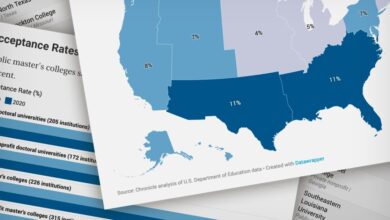College Rankings Are in Trouble. Do Their Users Care?

It’s been a long, dark winter for the U.S. News & World Report college rankings. In November, Yale Law School announced it would stop cooperating with the annual evaluations, leading to a wave of similar announcements from other top law and medical schools, and a few undergraduate-only institutions as well. Critics of the lists said the movement underscored that rankings do more harm than good, encouraging schools to let in more of the already privileged — whose test scores and ability to pay may help elevate a school’s placement — instead of working to serve a broad swath of society.
The unrest continued last week with the magazine’s decision to delay the release of its lists of best graduate schools after it received an “unprecedented number of inquiries from schools,” which get to see their rankings before they’re published.
In the war of words between U.S. News and college leaders, one set of voices may go unheard: those of the students the rankings are purportedly designed to serve. Has the surge of new criticism reached students choosing colleges? How do they use college rankings, anyway?
To get an unscientific snapshot, The Chronicle interviewed over a dozen students found, in part, on college tours at American University, in Washington, D.C., and the University of Washington at Bothell. The students described what role, if any, rankings played in their path to college. Almost none of the students had heard of the recent outcry over college rankings, but they had gotten the message, from school counselors or other people in their lives, that individual “fit” should trump rank. Few said they relied on rankings, which they understood to be flawed instruments, to make their decisions.
Still, the influence of rankings was evident. Several students said that even if they didn’t care about rankings, they had friends who did. Several also said that while they ignored colleges’ overall rankings, they sought information on what the top-listed schools were for the fields they wanted to major in, a practice some school counselors said they encouraged.
The trust students put in their school counselors and other voices around them, and their continued use of program rankings, suggested they still wanted an arbiter of quality — something that felt more objective and expert than figuring it out on their own. Rankings, fraught as they are, can fit the bill.
Thakur’s mother agreed. The family is from India, so she sought guidance on how to help her children through the American application process from parents’ groups on Facebook. Group members taught her that there’s a college for every child, which she found to be a relief. “Otherwise, it’s so competitive,” she said.
Nearly all of The Chronicle’s interviewees talked about looking more deeply at a college’s characteristics beyond its ranking. “There’s more to a school than just a ranking,” said Sally Carey, an 11th-grader who visited American University from South Carolina.
School counselors would be glad to hear it. For years, they’ve worked to loosen college rankings’ hold on students and families.
“Many counselors really work to pull back the curtain on them and explain that the rankings don’t compare the things that students and parents care about, in the way that they think they do,” said Emmi Harward, executive director of the Association of College Counselors in Independent Schools. “Folks are trying to get rid of a ranking, period, to try to get students to look at something that is more personal and qualitative rather than quantitative.”
Not all counselors would be happy to see the rankings go entirely, however. Some counselors, at both public and private schools, reported they still use U.S. News and other lists as a starting point for helping students decide where to apply. Richard Tench is a counselor at Saint Albans, a public high school in West Virginia, where about 60 percent of students are low income and 56 percent go directly to two- or four-year colleges after graduation.
For about half of his students planning to attend four-year universities, Tench advises using rankings lists to look up colleges’ retention and graduation rates, which are listed on institutional profile pages published by rankers, and colleges’ rankings for specific fields the students are considering majoring in. He said the lists can help students broaden their view while making sure they’re still looking at institutions with decent graduation outcomes. “I don’t want them going where their friends are going, or where their parents went, just because,” Tench said.
Some students use rankings as more than just a starting point, however. In nationally representative surveys, the proportion of first-year college students who say national magazine rankings were “very important” to their final college choice has hovered at a bit under 20 percent for about a decade.
Katherine Yu, a senior at Carmel High School in Indiana, frequents Reddit’s ApplyingToCollege forum, where posts tend to be prestige-oriented. Users often discuss U.S. News and other rankings, and use a lingo littered with the acronyms for top-ranked colleges, like HYPSM (Harvard, Yale, Princeton, Stanford, MIT) and WASP (Williams, Amherst, Swarthmore, Pomona).
Yu applied to 37 colleges, she said. “I kinda just went down the list,” she said. “I applied to almost all the top 20s.”
In addition to U.S. News’s top-20 national universities, she also sent materials to any college that didn’t require too much extra work on QuestBridge, a platform for low-income students to apply to selective institutions. In Yu’s view, where she got accepted was a big bragging point for her parents, but they hadn’t helped her much with her applications. They had gone to college in China and had little experience with the process in America.
U.S. News’s leaders have consistently defended the rankings as important sources of independent data for students. In a previous interview with The Chronicle, Eric J. Gertler, chief executive of U.S. News, said the enterprise’s mission was “to help students be able to access the best and most accurate information.”
In many ways, college rankings were made for students just like Yu. They emerged at a time when American college-going rates boomed. Between 1950 and 1987, when U.S. News published its first standalone America’s Best Colleges guidebook, the proportion of young American adults enrolled in colleges more than tripled, growing from 14 percent to 47 percent. All of these students, many of them the first in their families to get a higher education, helped create a demand for an easy way of assessing and choosing colleges.
Yu decided on her strategy — the numerous applications, the U.S. News-based list — on her own, hoping to get into a brand-name institution that her relatives would recognize. She didn’t really know what she wanted in a college: “Between colleges, there’s not that much of a difference in the academics, I would say.”
She got into Cornell University and Williams College, and planned to decide where to attend based on “atmosphere,” which she would judge during campus visits.
Like Yu, Lidia Workneh navigated college applications with little parental help. Her father, who’s living in Ethiopia, went to a four-year university there, but that was the extent of her parents’ experience with higher education.
Workneh used to want to be a neurosurgeon, until she did a Girls Who Code summer program, which turned her on to computer science. She was admitted to several public and private colleges in western Washington State, then looked up their rankings for computer science and eliminated two that were lower ranked. She didn’t remember the names of the rankings she used, but she found several by Googling and said they didn’t always agree.
Students who talked about using rankings the most tended to have taken on more of the application process themselves, with less input from parents and counselors. Meanwhile, students who attended private high schools that advertise their support for students’ college decisions talked about fit over rank.
It’s possible some of those students care more than they let on, or their parents may care more than they do. “There may be some families who are savvy enough to know that counselors hate [rankings] and that they shouldn’t be looking at something as potentially superficial as the ranking,” Harward said. “And so it may be important to them, but they may find other ways to signal the importance of a genre of school without ever mentioning the rankings.” Parents may come into a counselor’s office saying their child wants to “be challenged” or “be around other bright students,” when the child is already in over their head in their college-prep coursework, Harward said.
For students left more to their own devices, rankings may be nearly inescapable. After all, what happens when you punch “best colleges in Washington State” into a search engine? You get rankings.
Not that those students were entirely naïve. Yu recently looked up different rankings’ methodologies and was surprised to learn the extent to which U.S. News relies on a reputational survey sent to college leaders. How did those survey-takers decide one college was better than another? she wondered. What even is prestige? It’s not an outcome. Plus, even outcomes seemed fraught to Yu. “Like, top colleges get the best students. Of course they would have better outcomes than a normal college,” she said. How do you account for that advantage in a ranking? She wasn’t sure.
Source link






